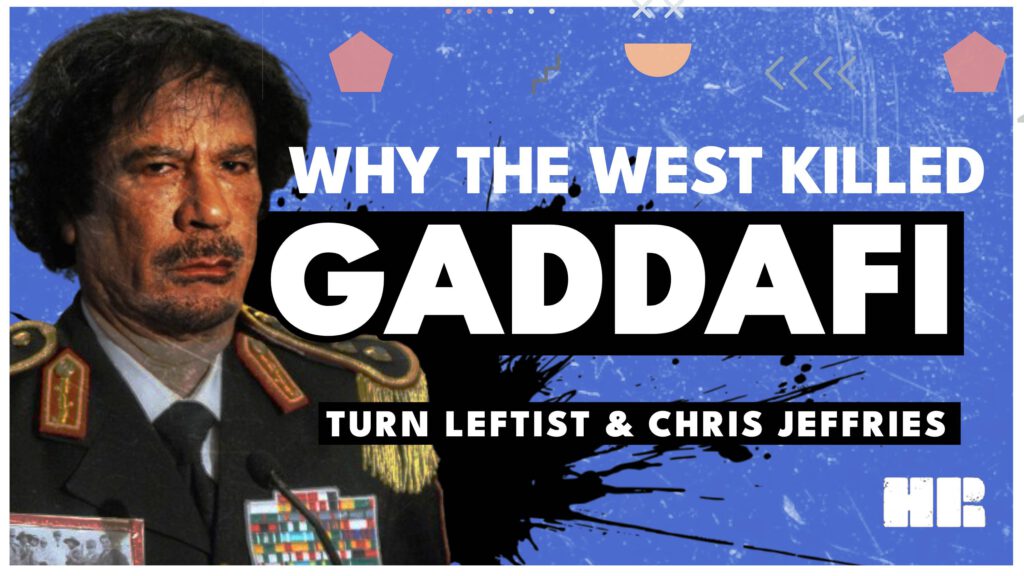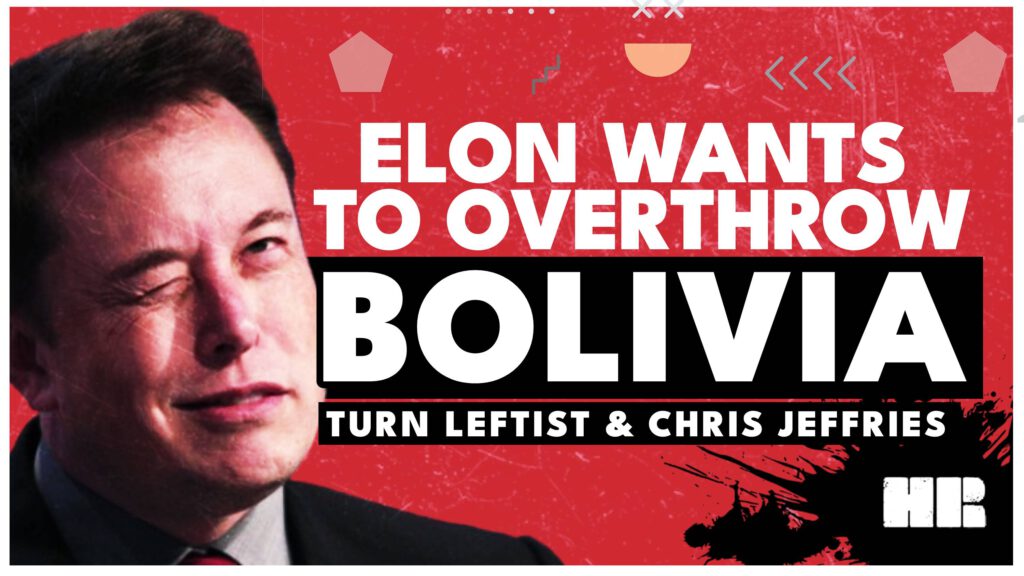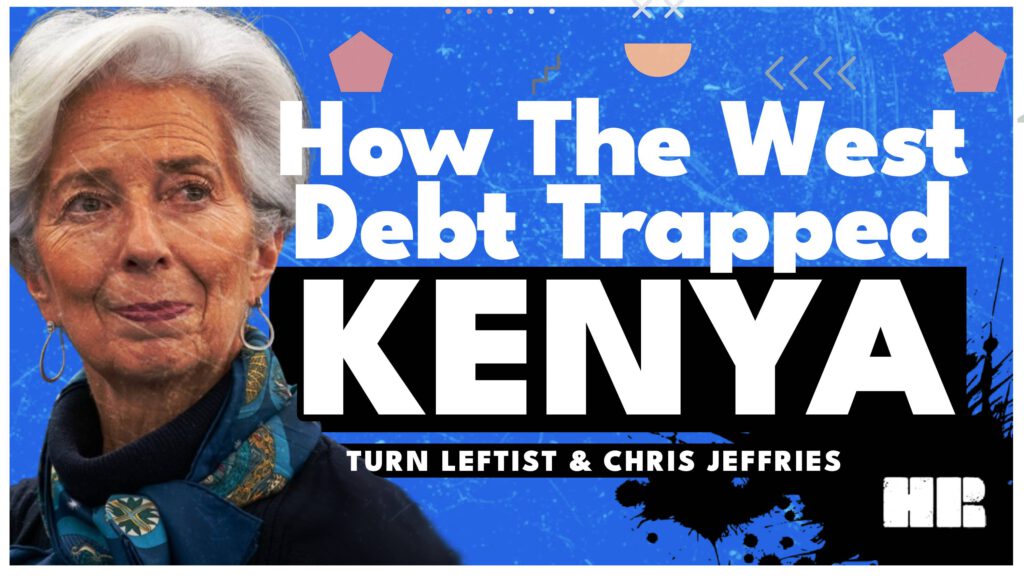NEW STUDY: Men are Voting Far Right in Record Numbers, While Women are Voting Left

Chris Jeffries and Mike from Turn Leftist discuss the growing gender gap in voting preferences in Western democracies. Women, particularly younger ones, are increasingly supportive of left-wing parties due to their preferences for economic redistribution and social policies. Men, on the other hand, are showing stronger support for right-wing and far-right parties. They provide statistics from various countries to support this trend and attributes it to the erosion of traditional male-dominated industries and the growing service-oriented economy. He also touches upon the challenges of engaging with individuals holding extreme political views and the need for a new conception of manhood that values adaptability, emotional intelligence, and cooperation.
Israel is Dumping Nuclear Waste in Palestine

Chris Jeffries accuses Israel of dumping nuclear waste in the Palestinian territories, specifically in the Hebron region of the West Bank. This alleged dumping has led to higher rates of cancer, disabilities, and deformities among the local population. The town of Yat is believed to be contaminated with radioactive uranium. Israel prevents Palestinian and international inspectors from accessing these suspected dumping grounds. The Palestinian Authority accuses Israel of using 98 landfills across the occupied West Bank to dump various types of waste, including nuclear waste. Chris Jeffries also mentions other ways Israel has treated Palestinians unfairly, such as restrictions on movement, home demolitions, forced evictions, and restrictions on access to natural resources. Israel places severe limitations on Palestinian civil and political rights to suppress dissent and maintain its system of domination. Chris Jeffries expresses frustration over the lack of action from the international community and calls for investigations into Israel’s waste disposal practices. They also encourage viewers to take actions they can to make a difference, such as spreading awareness and boycotting related products.
How The West Debt Trapped Sri Lanka

Ben Norton of Geopolitical Economy wrote an article that discusses the misleading accusations against China for Sri Lanka’s debt crises and economic instability. Contrary to popular belief, 81% of Sri Lanka’s external debt is owed to Western financial institutions and allies, while China holds only 10%. The West’s accusations are criticized as misleading, given Sri Lanka’s long history of struggling with Western debt and the IMF’s failed economic stabilization programs since gaining independence from British colonialism in 1948. Chris Jeffries also highlights the role of Western financial institutions and the use of the dollar in trade due to military presence, not voluntary agreements. The media’s blame game against China is challenged, and the speaker accuses The Wall Street Journal of misrepresenting facts and prioritizing political points over journalism. Chris Jeffires also touches upon the ongoing conflict in Ukraine and the West’s unwillingness to negotiate for peace, prioritizing financialization over diplomacy. Then it concludes by discussing the decline of reputable cable channels into sensationalist media driven by profit motives and advocating for socialism and democratic control over institutions to prevent harmful business practices.
How Gaddafi Was Wrongfully Branded a Dictator and Killed by the U.S.

Chris Jeffries disputes the Western portrayal of Muammar Gaddafi as a brutal dictator and highlights his achievements in transforming Libya into a country with a high development index, prioritizing education, healthcare, and housing. Chris Jeffries argues that Gaddafi’s socialist ideas and progress were manipulatively overshadowed by allegations of human rights abuses, which lacked concrete evidence. Mike criticizes the 2011 intervention as a ploy to sow chaos and take control of Libya’s resources, leading to the country’s descent into chaos, economic collapse, and a humanitarian crisis. He also touches on the flaws of capitalism and the importance of building sustainable systems for future generations.
The US, Israel and Ukraine | Greg J. Stoker

Greg J. Stoker, he shares his personal journey from being a military participant in US imperialism to an anti-imperialist activist. He critiques the morality and effectiveness of US wars, specifically the Obama administration’s drone strike policy and the lack of accountability for civilian casualties. Stoker also discusses his concerns over Israel’s military actions, including the use of controversial weapons like white phosphorus and medieval siege weapons, and their strategic unsoundness. The conversation also covers the concept of different generations of warfare, the Israeli-Palestinian conflict, and the ongoing war in Ukraine, with a focus on the role of the US and Israel. Stoker argues that resistance movements, such as those in Ukraine, suffer more casualties due to a lack of resources and advanced technology, and that the war in Ukraine lacks a clear exit strategy or defined objectives. He also touches upon the role of China and Russia in global affairs and their involvement in resource extraction in countries like the Congo. Throughout the discussion, Stoker sheds light on the complexities and ethical dilemmas of military involvement in foreign conflicts.
Elon Musk Advocates for Overthrowing Bolivia, The Country with the Largest Lithium Reserves

Elon Musk’s controversial advocacy for overthrowing the Bolivian government to gain access to their vast lithium reserves is discussed. Musk’s statement, made several years ago in response to a tweet about a US-backed coup against Bolivian President Evo Morales, was criticized for his apparent excitement about easier access to the country’s mineral wealth. Mike argued that someone may have planned the coup in advance and released a headline about lithium discoveries in Pennsylvania to distract from Bolivia’s resources.
Mike also shared his perspective on humanity’s need for vast amounts of power and the importance of considering the feelings of all living beings, not just humans. However, his advocacy for exploiting Bolivia’s lithium reserves was criticized for hypocrisy, given his portrayal as a visionary leading humanity towards a sustainable future. The speaker also discussed Musk’s deletion of a tweet expressing his desire to overthrow Morales and compared it to the actions of 19th-century coal barons.
The historical context of Western attempts to interfere in Bolivia’s politics was also touched upon, including the fabricated sexual misconduct allegations against Morales and the use of coercion and political maneuvering to discredit him. The speaker argued that this incident was reminiscent of past CIA interventions in Bolivia and throughout Latin America. Musk also engaged in a conversation about free speech and the manipulation of information, expressing his frustration with double standards and the lopsided support for the US empire.
They emphasized the importance of understanding and accepting people’s perspectives before jumping to conclusions and criticized the hypocrisy of targeting people of color for perceived wrongdoings while ignoring the actions of the wealthy and powerful. Mike also reflected on his cynical worldview and the human capacity for both good and bad, expressing his admiration for disappointed idealists and his belief that humanity had great gifts but had squandered them through modernity and industrialization.
How Anti-Depressants Ruined America | Robert Whitaker

Robert Whitaker, the author and journalist discusses the controversial link between antidepressants and suicide risk. He shares a personal story about a friend who attempted suicide after being prescribed antidepressants and explains that there is evidence dating back 30 years showing that SSRI antidepressants can induce suicide in some people. Whitaker also criticizes the pharmaceutical industry for downplaying the risks and allowing these drugs to be marketed without clear warnings. The discussion then shifts to the rise of contract research organizations (CROs) in the mid-1990s and how they corrupted clinical trials, particularly in psychiatry. Whitaker argues that instead of improving mental health, we often diagnose and medicate people, such as children with ADHD, and criticizes the blind obedience to this status quo. He also discusses the importance of understanding risks and benefits in a capitalistic environment and advocates for strict regulation and oversight of corporations. Whitaker encourages individuals to become informed consumers and do their own research, and his organization, Mad in America, aims to help people make informed decisions about psychiatric treatments.
How the IMF Debt Trapped Kenya Causing Nationwide Protests

Chris Jeffries and Mike from Turn Leftist discuss how the International Monetary Fund (IMF) and Western banks have debt-trapped Kenya, leading to widespread protests. The IMF’s austerity measures, privatization, and deregulation policies have disproportionately affected the poorest segments of society, causing significant economic hardship and social unrest. Jeffries challenges the common perception that China is the only country engaging in debt trap diplomacy in Africa and defends African leaders who resist Western colonialism. The speaker also discusses the contentious relationship between the IMF and countries like Argentina, Ukraine, and Kenya, and the economic hardships and social unrest caused by the IMF’s austerity measures. Jeffries argues that in countries where right-wing ideologies and gun ownership are prevalent, there is a higher likelihood of fascist forces prevailing, and expresses skepticism towards international development initiatives backed by the IMF. Mike also critiques the historical involvement of Western powers in conflicts around the world, arguing that their interventions were not always driven by humanitarian concerns or defensive measures.
Louisiana has 5 times more Prisoners than Saudi Arabia

Louisiana’s unusually high incarceration rate, which is over five times higher than Saudi Arabia’s. The speaker criticizes the private prison industry in the United States for contributing to the country’s high prison population, with two major corporations, CoreCivic and Geo Group, having large capacities to house a significant number of prisoners. The speaker also mentions the use of prison labor by corporations such as Walmart, McDonald’s, Victoria’s Secret, and Whole Foods. The speaker argues that the American justice system is more focused on incarceration than execution, driven in part by the profit motive of private prisons. The speaker criticizes the public for being delusional about the realities of incarceration and the high incarceration rates in the United States, particularly in Louisiana, which has a unique system of housing state prisoners in local jails. The speaker expresses concern over the mindset of prison guards, who prioritize their jobs despite the negative consequences for individuals and communities. The video continues to explore the reasons behind the high incarceration rates in the United States and their impact on society.
How Henry Ford Was A Fascist | Turn Leftist & Chris Jeffries

the hosts explore Henry Ford’s fascist beliefs and practices, including his use of union busting and dissemination of far-right political viewpoints through his newspaper, The Dearborn Independent. Ford’s rejection of modernism, promotion of racist ideologies, and obsession with Jewish plots are discussed as key elements of fascism. The video also touches upon the societal context of the era, including the fear of communism and the proletarianization of people, which contributed to the rise of fascism in America. The speakers draw parallels between Ford’s practices and modern-day fascist tendencies, such as fear-mongering language, appeals to the middle class, and invasive worker surveillance.